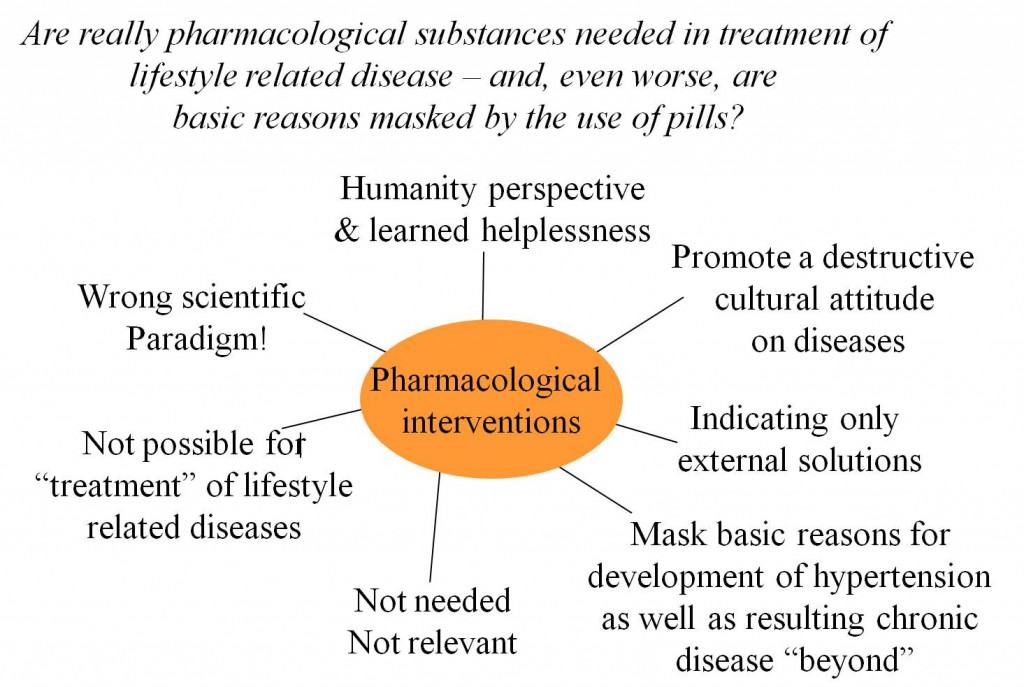OICstress (Observe, Identify & Change stress).
With focus on lifestyle related diseases and problems
That lifestyle related diseases and problems are primary “treated” with changed of individuals´ own lifestyle related behaviors may be self-evident for laymen but it is not yet by the medical society, how strength it may appear. This especially as there is a biopsychosocial medicinal field existing (Engel, 1977) which is increasing developed designed to be able to dealing with lifestyle related diseases and problems.
How come? There are still, to some scientists and clinicians astonishment, a number of reasons for this:
- The success a simplistic, reductionistic medical paradigm, had with treatment of micro-organism related diseases simply keep going for treatment of lifestyle related diseases of reasons, which hardy can have a scientific reason, which is mystification not explainable scientific correctly. And the same time is the basic state of art that pharmacological “treatments“ still are the golden standard for treatment of lifestyle related diseases. Good for stockholders but not for the rest of those suffering in populations as well as societies escalating costs
- The consequence of the above is that
- At scientific level
i. Not substantial knowledge developed enabling an effective biopsychosocial multifaceted systems integrating platform is going on – resulting to that biopsychosocial medicine can be attributed and accredited as in prior for a pharmacological treatment. The present knowledge level in biopsychosocial medicine can be used for some diseases/problem as hypertension, which is the focus for our project.
ii. Medical methodology is not design to deal with a lifestyle related focus. Arguments like “not proven” or “not evidenced based” is not valid in this discussion, while the argument “not evidence exists” relates to methodological shorts-coming and nothing else – which obviously politicians and the public not understand and realize.
iii. Clinical work rest on work with people and not “something averaged” which means that sound research must be focused on both individuals (ideographic) and general (nomothetic). As the medicinal science give to direction to clinical work the concept of evidence focus on treatment, primary pharmacological interventions or simplistic psychosocial approaches as biofeedback, instead of evidence base individuals multifaceted lifestyle based improvement/development primarily. This project deals with both a ideographic and normative perspective enabling nowadays using Individual Evidenced based Documentation and a combination of analysis tools based on traditional and artificial intelligence approaches – the ReLy (Reference Library) in this project.
3. At practice level
i. Point of departure is that lifestyle related diseases and problems are “treated” with individuals´ education and “tailored” implementation of learned tools from a biopsychosocial based stress medicine toolbox.
ii. In our version focus is on
- Trying to find out basic lifestyle related reasons for individuals´ expressions of their diseases using a integrated psychophysiological stress profile test. As a biopsychosocial medicine perspective is very complex, we focus on what we regard as best understood, that is in hypertension as example, analysis of autonomic nervous system functioning related to biopsychosocial stress and consequences of malnutrition, not functional exercise and biologic state of art in respiratory psychophysiology.
- Based on the above Lifestyle (biopsychosocial) medicine practice focuses in our version on using obtained information from ReLy (reference library) to both with respectively individual formulate an intervention plan as well as used intial data for IBED – individual Biological Evidenced based Documentation to validate the process as feedback for modification when needed as well as for pre-post tests conclusions.
- The concept above rests on Observation, Identification and Change – OICstress where stress here is defined as a systems out of steady state (see ….???) and we use present possible readable data based on a biopsychosocial paradigm during development.
- Summarizing: Lifestyle related diseases and problem is analyzed and “treated” with education and self-activities/training. As the medical paradigm still is “young” (1977 in our western medicine) we are carefully using knowledge, methodology and practice we regard as satisfactory. This while pharmacological “treatment” lack lifestyle related medical credibility. A humble biopsychosocial medical attitude towards individuals´ suffering lifestyle related diseases and problems is at present the only way to deal with it. As the traditional medical school medicine is not yet ready we need to approach both individuals directly with education and biopsychosocial intervention guidance as well as the formal medicinal institutions, when they are motivated to work for a radical change of paradigm – a huge challenge with many, many consequences. But what is the alternative?
Old prover; Give an individual a fish (pill?) and s/he might be pleased for a day, teach her/him to fish (biopsychosocial tools) and s/he can be satisfied for whole life – when s/eh learns how to used them (education and training).
Our metaphor during the years is “healthcreators” or “man as a health creator” based on George Kelly´s (1955) “man as a scientist”.
Below a picture expressing the above critics against pharmacological use in lyfestyle related diseases
References:
Engel, G.L. (1977).The need for a new medical model: A challenge for biomedicine. Science, 196, 129-136
Kelly, G. A. (1955). The psychology of personal construct, Vol.1. New York: Norton
von Schéele, B.H.C. (1986). Assessment of a multifaceted treatment of negative stress: A cognitive and cardiovascular approach. Acta Univ. Ups. Comprehensive Summaries of Uppsala Dissertation from the Faculty of Social Sciences 4. Uppsala.
von Schéele, B.H.C. (1988). Cognitive Behavioral Medicine. Manuscript. Bollnäs: Trace.


